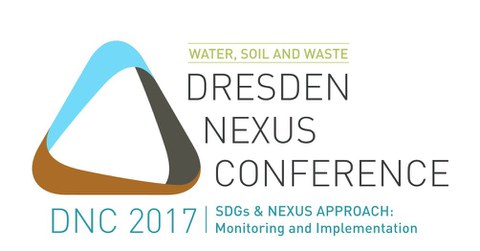Mar 07, 2017
International Conference on Resource Management Strategies for Achieving the Sustainable Development Goals in Dresden
How can the Nexus Approach contribute to the integrated management of environmental resources for sustainable development? This question is at the heart of the second biennial Dresden Nexus Conference (DNC2017) hosted by the United Nations University (UNU-FLORES), TU Dresden, and IOER from 17 to 19 May 2017. More than 300 participants from all over the world are expected at the Deutsches Hygiene-Museum Dresden.
The integrated management of natural resources such as water, soil, and waste, the so-called Nexus Approach, is crucial for achieving the United Nations Sustainable Development Goals (SDGs). There was much consensus on this point at the Dresden Nexus Conference 2015. The second edition of the conference will take place from 17 to 19 May, under the heading "The Sustainable Development Goals and the Nexus Approach: Monitoring and Implementation". The second DNC is devoted to identifying specific strategies and related requirements for the implementation and monitoring of integrated approaches. The focus is on two themes that show particularly well how important the integrated management of resources is for implementing the SDGs: Multifunctional Land-Use Systems and Resource Management in Resilient Cities. Concrete research projects and case studies will be presented, which show the close connection between the Nexus Approach and selected SDGs.
For the first edition of the biennial conference, more than 350 participants from 65 countries came to Dresden in 2015. This year, again many top international researchers as well as experts from business and politics are expected, including representatives of various UN organisations and several institutes of the United Nations University. In addition, experts from renowned international research institutions, from ministries, and from non-governmental organisations will take part.
What is the "Nexus Approach"?
The goal of the Nexus Approach is to manage environmental resources sustainably. In order to achieve this, it is necessary to overcome barriers between individual sectors and scientific disciplines to jointly develop cross-sectoral strategies. The approach is based on the understanding that individual environmental resources are closely linked. If these relationships are taken into account, this can lead to more resource efficiency, while at the same time environmental risks and ecological degradation may be minimised.
Dresden Nexus Conference 2017 – SDGs and the Nexus Approach: Monitoring and Implementation
17–19 May 2017
Deutsches Hygiene-Museum Dresden
Lingnerplatz 1
01069 Dresden, Germany
Registration open until 17.04.2017:
http://www.dresden-nexus-conference.org/2017/participation/registration/
For further information:
http://www.dresden-nexus-conference.org
https://sustainabledevelopment.un.org/
Media inquiries:
Rachel Shindelar
UNU-FLORES
Communications and Advocacy Associate
Tel: +49 (0) 351 8921-9377
Heike Hensel
IÖR
Press and Public Relations
Tel: +49 (0) 351 4679-241
Claudia Kallmeier
TU Dresden
Press Officer
Tel.: +49 (351) 463-40761
An Overview of the Organisers
United Nations University Institute on the Integrated Management of Material Fluxes and of Resources
United Nations University aims to develop sustainable solutions for pressing global problems of human survival and development. The Institute for the Integrated Management of Material Fluxes and of Resources (UNU-FLORES) was established in Dresden, Germany in December 2012. The institute engages in research, capacity development, advanced teaching and training. UNU-FLORES develops strategies to resolve pressing issues in the area of sustainable use and integrated management of environmental resources such as soil, water, and waste. https://flores.unu.edu/
Leibniz Institute of Ecological Urban and Regional Development (IOER)
The Leibniz Institute of Ecological Urban and Regional Development (IOER) is an establishment of the Leibniz Association for research in the spatial sciences. The IOER develops the scientific basis for the sustainable development of cities and regions in the national and international context. Research addresses ecological issues of sustainable development. https://www.ioer.de
Technische Universität Dresden
The Technische Universität Dresden (TU Dresden) is one of Germany’s eleven universities of excellence: strong in research and considered first-class with respect to the range and quality of the study programmes it offers, it is also closely interconnected with culture, business, and society. A strategic partnership between the Faculty of Environmental Sciences at TU Dresden and UNU-FLORES has been established, which has led to joint research projects and a doctoral degree programme in “Integrated Management of Water, Soil and Waste”. https://tu-dresden.de/en

